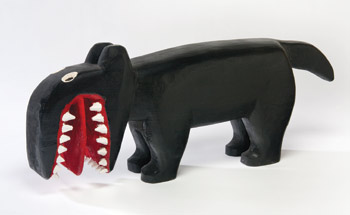Longwood University is becoming home to an invaluable collection of academic materials in a burgeoning field of scholarly research: folk art.
The Folk Art Society of America has entered into an agreement with Longwood University to gradually transfer the society to the university. Longwood will become a major repository for the FASA archives—an irreplaceable trove of more than a thousand books, catalogues and other primary sources that detail much of the rich history of folk art across the world.
The archives will be located in an environmentally protected space in Farmville, to be known as the Folk Art Research and Study Center. In addition to the books and catalogues, the archive consists of letters, posters, exhibition announcements, photographs, printed matter, slides, videotapes, written records and other memorabilia. These records will be digitized and made widely available for research and study.
In its many iterations—from indigenous art to outsider art—folk art at its root is characterized by the artist’s lack of formal training. While countless collectors and enthusiasts have acquired vast collections of folk art, it was not until recently that academic study of the discipline began to flourish. With several prominent art historians delving into folk art, and even a folk art major at the University of North Carolina, the field is exploding with serious inquiry.
"The affiliation of the Folk Art Society of America with Longwood University will ensure the future of the society and its programs," said former FASA president Ann Oppenhimer, herself a former art history instructor at the University of Richmond. "We plan to continue the Folk Art Messenger magazine, the annual national conference and especially the preservation of the archives, which have been collected over a period of 30 years. These historical records will form the basis for a national study center that will benefit Longwood students as well as scholars in the important and ever-expanding field of self-taught, visionary and folk art."
Ann and William Oppenhimer, major benefactors of Longwood University and the Longwood Center for the Visual Arts, founded FASA in 1987 with a group of local Richmond collectors. The society grew under their watchful guidance and is now a viable national organization with more than 600 members. In its new form, it will be officially named the Folk Art Society of America at Longwood Center for the Visual Arts, or FASA@LCVA.
"That the LCVA is in a position to secure one of the most important repositories of folk art archives in the United States is a testament to our reputation as an innovative, ground-breaking museum and our dedication to fully integrating important art with academic material," said Rachel Talent Ivers, LCVA director. "The Folk Art Society of America is a well-respected organization, and we are delighted to have it transition under the LCVA umbrella."
"Folk art is representative of a wide swath of American culture that has historically not been as appreciated and respected as other forms of art," said Ivers. "That is all changing, and with the addition of this repository and other FASA assets to the LCVA’s current folk art collection, Longwood University will become the place to look for academic folk art research."
The four main assets of FASA will transition to the LCVA—The Folk Art Messenger, a magazine for folk art enthusiasts and collectors published three times a year, an annual conference, an art auction and the FASA website. The award-winning magazine is one of only two such magazines worldwide publishing in English. The annual conference, traditionally held in a different location in the U.S. each year, attracts prominent speakers and attendees from across the United States.
The LCVA is home to a sizeable folk art collection—supported by numerous gifts over several decades. In addition to the Oppenhimers’ donations, gifts from Thomas and Donna Brumfield and current FASA president Jim Sellman, and his wife, Barbara, have bolstered the collection’s value and importance. The collection has been the basis for several exhibitions at the Farmville museum. The 2011-12 exhibition Three-Ring Circus was a major success that featured exclusively pieces from the Oppenhimer Folk Art Collection.
Fundraising has begun in earnest to create an endowment for an executive director of FASA@LCVA. A national search for the position is planned, and the director will also qualify for an academic position at Longwood University.



Leave a Comment